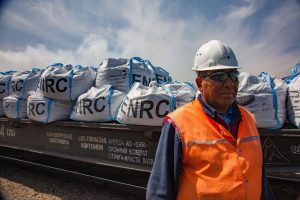18 Feb 2022 | Statements, United States
The undersigned organisations express their serious concern at the legal proceedings, also known as SLAPPs, that have been brought against investigative journalist Scott Stedman, his US media company Forensic News, and three of his colleagues.
Between June 2019 and June 2020, Forensic News published six articles and a podcast about the business affairs of British-Israeli security consultant and businessman Walter Soriano, after he was summoned by the United States’ Senate Intelligence Committee. The Committee was reportedly interested in Soriano’s connections to several people of interest, including the Russian oligarch Oleg Deripaska, who had been a former business associate of Donald Trump’s campaign chairman Paul Manafort.
The Forensic News team was sued by Soriano in July 2020, one month after they published their last article about him. Although the defendants are all based in the United States and Forensic News is incorporated in the state of California, the lawsuit has been brought in London.
A total of five claims were made in relation to data protection, libel, misuse of private information, harassment, and malicious falsehoods. Two of the claims, harassment and malicious falsehoods, have since been dismissed.
“We believe that the lawsuit that has been brought against Forensic News is a SLAPP,” the undersigned organisations said. SLAPPs abuse the law in order to silence critical coverage on matters of public interest. Index on Censorship has filed a media freedom alert to the Council of Europe Platform for the Protection of Journalism and Safety of Journalists.
“The case has many of the hallmarks of a SLAPP, including that Soriano is not only suing the news organisation, but also the four individual reporters. He also has lawsuits pending against investigative journalists in France and Israel, as well as against Twitter in Ireland,” the organisations said.
Due to the extremely expensive nature of mounting a legal defence in England and Wales, Forensic News is having to raise funds through an online crowdfunding campaign. The case is expected to go to trial before the end of 2022.
SIGNED:
Index on Censorship
Blueprint for Free Speech
The Campaign for Freedom of Information in Scotland (CFoIS)
Coalition For Women In Journalism (CFWIJ)
The Daphne Caruana Galizia Foundation
English PEN
European Centre for Press and Media Freedom (ECPMF)
IFEX
International Press Institute (IPI)
Justice for Journalists Foundation
Organized Crime and Corruption Reporting Project
Osservatorio Balcani Caucaso Transeuropa (OBCT)
PEN International
Reporters Without Borders (RSF)
Spotlight on Corruption
14 Jan 2022 | Legal action against journalists, News, United Kingdom
The undersigned organisations reiterate their support for award-winning journalist and author, Carole Cadwalladr, who is facing a week-long defamation trial in London this week. Cadwalladr, who works for the Guardian Media Group in the UK, is being sued as an individual by millionaire businessman and political donor Arron Banks, best known for his role as co-founder of the 2016 Brexit campaign Leave.EU.
Banks originally filed four claims against Cadwalladr in July 2019, two of which he dropped in January 2020 after the judge found them to be “far-fetched and divorced from the specific context in which those words were used”. The remaining claims relate to Cadwalladr’s 2019 TED Talk, “Facebook’s Role in Brexit – and the Threat to Democracy” and a Twitter post linking to the TED Talk.
“When this lawsuit was filed more than two years ago, several organisations came together to call this legal action out as a strategic lawsuit against public participation (SLAPP), aimed at intimidating and silencing Cadwalladr. We today reaffirm this characterisation and unreservedly reiterate our support for Cadwalladr as she continues to defend her public interest work,” the organisations said.
SLAPPs abuse the law in order to intimidate and silence public watchdogs from speaking out on matters of public interest. Banks is pursuing legal action against Cadwalladr as an individual, rather than pursuing her media outlet in which the contested claims were originally made. Due to the expensive nature of the process in England, Cadwalladr has had to raise funds for her legal defence through crowdfunding. She has so far raised more than half a million pounds.
“We, once again, urge the UK government to consider measures, including legislative reforms, that would protect journalists and others working in the public interest from being subject to abusive legal actions intended to stifle public debate,” the organisations concluded. “Our democracy relies on the ability to hold power to account.”
Representatives from several of the undersigned organisations will be in attendance at the High Court this week to monitor proceedings.
Signed:
Index on Censorship
ARTICLE 19
Association of European Journalists
Campaign for Freedom of Information in Scotland (CFoIS)
Committee to Protect Journalists
English PEN
European Centre for Press and Media Freedom (ECPMF)
IFEX
International Press Institute (IPI)
Justice for Journalists Foundation
Mighty Earth
Organised Crime and Corruption Reporting Project (OCCRP)
PEN International
Reporters Without Borders (RSF)
Society of Journalists
Spotlight on Corruption
The Daphne Caruana Galizia Foundation
Whistleblowing International Network
24 Nov 2021 | News, Statements

Writer Catherine Belton
The undersigned organisations express their serious concern at the legal proceedings that are being brought against journalist and author Catherine Belton and her publisher HarperCollins.
The two defamation lawsuits are being brought by Russian businessman Roman Abramovich and the Russian state energy company Rosneft in relation to Belton’s book, Putin’s People: How the KGB took back Russia and then took on the West, which was published in April 2020.
Abramovich’s complaint relates to 26 extracts in the book, including the suggestion that his purchase of Chelsea Football Club in 2003 was directed by Russian president, Vladimir Putin. Rosneft’s complaint relates to claims that they participated in the expropriation of Yukos Oil Company, which had been privately owned by businessman Mikhail Khodorkovsky. Both claims were filed in March 2021.
“We believe that the lawsuits against Belton and HarperCollins amount to strategic lawsuits against public participation (SLAPPs),” the organisations said, referring to a form of legal harassment used by wealthy and powerful entities to silence journalists and other public watchdogs.
“SLAPPs are used to drain their targets of as much time, money, and energy as possible in order to bully them into silence. The individual may be sued personally and several lawsuits may be brought at the same time, including in different jurisdictions,” the organisations said. “These are hallmarks of SLAPPs, and they’re consistent with what Belton and HarperCollins have faced.”
Five separate claims were initially filed against Belton and HarperCollins, but three have since been resolved without the need for costs or damages being awarded to the claimants. In June 2021, Abramovich filed an additional lawsuit against HarperCollins in Australia in relation to Belton’s book.
“We, once again, urge the UK government to consider measures, including legislative reforms, that would protect public watchdogs from being subject to burdensome, lengthy, and financially draining legal actions, which can stifle public debate,” the organisations concluded. “Our democracy relies on their ability to hold power to account.”
SIGNED:
ARTICLE 19
Association of European Journalists (AEJ)
AEJ Polish Section
Blueprint for Free Speech
Campaign for Freedom of Information in Scotland (CFoIS)
Citizen Network Watchdog Poland
Cyrus R. Vance Center for International Justice
English PEN
European Centre for Press and Media Freedom (ECPMF)
Index on Censorship
IFEX
Justice for Journalists Foundation
National Union of Journalists (NUJ)
OBC Transeuropa (OBCT)
PEN International
Reporters Without Borders (RSF)
Society of Journalists, Warsaw
Spotlight on Corruption
The Daphne Caruana Galizia Foundation
8 Oct 2021 | Kazakhstan, Legal action against journalists, Media Freedom, News, Slapps, United Kingdom
[vc_row][vc_column][vc_column_text]

Metal Alloy plant. Worker in orange jacket and white hardhat on train with Eurasian Resources Group (ENRC). Alexey Rezvykh / Alamy Stock Photo
The undersigned organisations express their serious concern at the legal proceedings that have been filed in a UK court against journalist and author Tom Burgis, his publisher HarperCollins, and his employer the Financial Times (FT). Two lawsuits have been filed by Kazakh multinational mining company, Eurasian Natural Resources Corporation (ENRC), for what it claims are a series of “untrue” and “highly damaging” allegations made by the defendants about the company.
The first lawsuit, against Burgis and HarperCollins, centres around multiple passages in Burgis’ 2020 book Kleptopia: How Dirty Money is Conquering the World. The second lawsuit, against Burgis and the FT, relates to two FT articles by Burgis, eleven Twitter posts by Burgis based on the articles, and an FT podcast in which Burgis was interviewed about his investigation.
“We are extremely concerned that the lawsuits against Tom Burgis, HarperCollins, and the FT are Strategic Lawsuits against Public Participation (SLAPPs). SLAPPs are a form of legal harassment used by those with deep pockets to silence journalists and other public watchdogs by exploiting intimidatingly long and expensive legal procedures,” the undersigned organisations said.
The lawsuits filed in London follow earlier legal suits by ENRC in US courts against HarperCollins seeking disclosure of wide-ranging information relating to the publication of Burgis’ book and newspaper articles published in the FT. In the London lawsuits, ENRC claims that the publications defamed the company, including by falsely suggesting that it was involved in the deaths of two whistleblowers (former ENRC employees), whose bodies were found at a motel in Missouri in 2015.
A criminal investigation by the UK’s Serious Fraud Office into alleged corruption within ENRC opened in 2013 and is ongoing. It is understood to be focused on allegations of fraud, bribery and corruption around the acquisition of substantial mineral assets in the Democratic Republic of Congo and elsewhere. No charges have yet been brought. ENRC denies all allegations.
Since the SFO announced its investigation, ENRC has initiated a wave of more than 18 legal proceedings in the US and the UK against journalists, lawyers, investigators, contractors, and a former SFO official and the SFO itself. In June 2021, twenty-two organisations issued a statement condemning the ENRC’s lawsuits against public watchdogs.
“The lawsuits against Burgis, HarperCollins, and the FT are the latest in a deluge of litigation brought by ENRC as it attempts to robustly challenge corruption allegations,” the organisations said. “We are extremely concerned that ENRC’s legal tactics are a further attempt to silence those who interrogate any possible links between the company and incidents that warrant proper public scrutiny.”
“We urge the UK government to consider measures, including legal measures, that would protect journalists and other public watchdogs from abusive legal actions that are aimed at silencing them,” the organisations concluded. “Our democracy relies on their ability to hold power to account.”
The legal proceedings against Burgis, HarperCollins, and the FT were filed at the High Court of Justice of England and Wales on 27 August. The first hearing has yet to be scheduled.
Note to editors: ENRC was listed on the London Stock Exchange until 2013, when it became embroiled in controversy over governance issues and went private. Today it is owned by Eurasian Resources Group registered in Luxembourg. The ‘Trio’ who own the majority shares in ENRC (now ERG) are Alexander Machkevitch, Patokh Chodiev and Alijan Ibragimov. Mr Ibragimov died in February 2021. The Kazakh state owns an estimated 40 percent of the company.
SIGNED:
ARTICLE 19
Blueprint for Free Speech
Campaign for Freedom of Information in Scotland (CFoIS)
English PEN
IFEX
Index on Censorship
Justice for Journalists Foundation
Organized Crime and Corruption Reporting Project (OCCRP)
Osservatorio Balcani Caucaso Transeuropa (OBCT)
PEN International
Reporters Without Borders (RSF)
Rights and Accountability in Development (RAID)
Spotlight on Corruption
The Daphne Caruana Galizia Foundation
The European Centre for Press and Media Freedom
[/vc_column_text][/vc_column][/vc_row]


